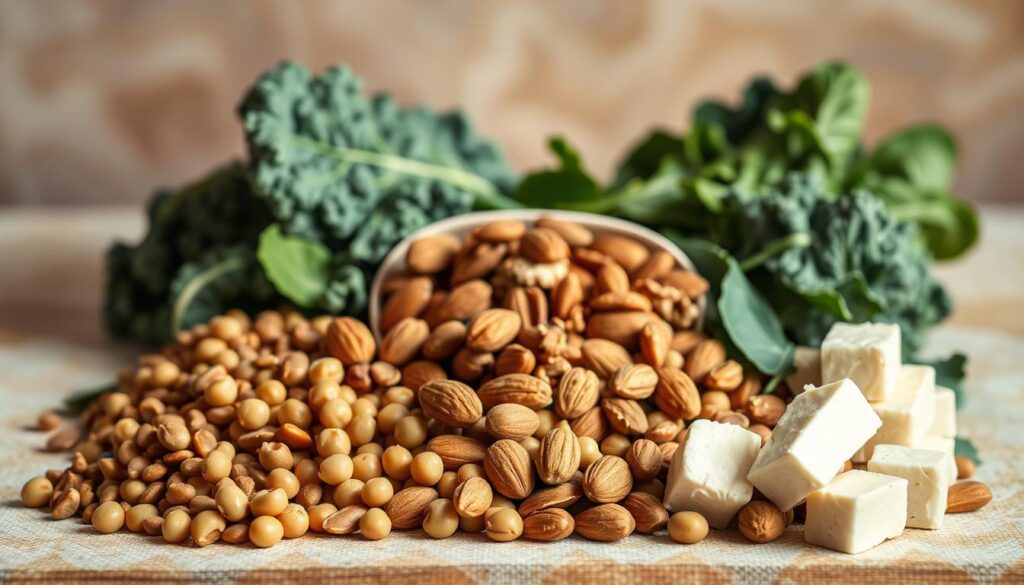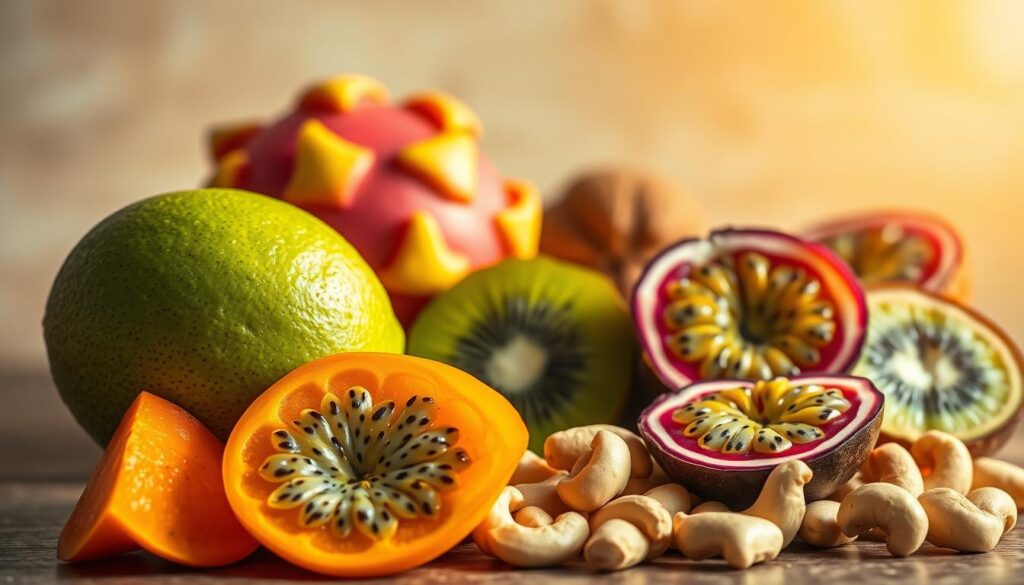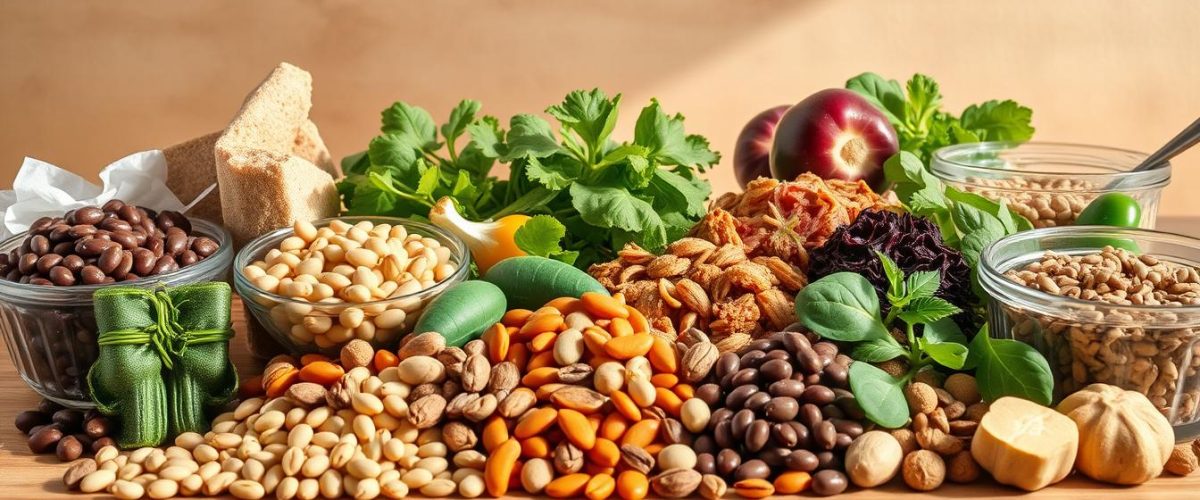Exploring plant-based nutrition means learning about protein in your diet. Protein is key for your muscles, skin, and organs, making up 17% of your body’s weight.
So, where can you find high-quality protein in plant-based foods? With veganism on the rise, knowing the best vegan protein sources is vital for a balanced diet.
Protein is made of amino acids, which your body can’t make itself. So, getting enough from food is important for your body’s repair and growth.
Understanding Vegan Protein Sources
For those on a vegan diet, finding good protein sources is key. Vegan proteins come from plants like legumes, nuts, seeds, and whole grains.
What Are Vegan Proteins?
Vegan proteins are made from plants and are vital for our health. Unlike animal proteins, they might lack some amino acids. But, a smart diet can help get all needed amino acids from plants.
There are 20 amino acids, with nine being essential. While animal foods are often seen as complete, some plants are too. For instance, quinoa has all nine essential amino acids.
| Food | Protein Content per Serving | Serving Size |
|---|---|---|
| Lentils | 18g | 1 cup cooked |
| Chickpeas | 15g | 1 cup cooked |
| Tofu | 20g | 3 oz serving |
The Importance of Protein in Your Diet
Protein is vital for muscle repair, growth, and body functions. It’s especially important for vegans to get enough.
Key Functions of Protein:
- Muscle repair and growth
- Production of enzymes and hormones
- Supporting immune function
By eating a variety of plant-based protein options, you can meet your protein needs. Legumes, nuts, seeds, and whole grains are some of the top vegan protein foods.
Legume-Based Protein Sources
Vegan protein-rich foods are abundant, and legumes are a top choice. They are full of protein, fiber, and essential nutrients. This makes them a key part of many vegan diets.
Lentils: Nutritional Benefits
Lentils are a nutritional powerhouse, with 18g of protein per cup. They also have lots of fiber, vitamins, and minerals. This makes them a great fit for a vegan diet. You can add them to soups, salads, and more.
Chickpeas: Versatile and Delicious
Chickpeas are a versatile legume, offering 15g of protein per cup. They are also a good source of fiber and vitamins. You can use them in salads, stews, and even as a main ingredient in dishes like hummus.
Black Beans: A Protein Powerhouse
Black beans are tasty and packed with 15g of protein per cup. They are also high in fiber and folate. You can add them to rice bowls, salads, and tacos.
| Legume | Protein Content (per cup) | Additional Nutritional Benefits |
|---|---|---|
| Lentils | 18g | High in fiber, vitamins, and minerals |
| Chickpeas | 15g | Rich in fiber, vitamins, and minerals |
| Black Beans | 15g | High in fiber, folate, and other essential nutrients |
Adding these legumes to your meals can greatly increase your protein intake. They also offer many other health benefits. Whether you’re making lentil soup, chickpea salad, or black bean dishes, you’re choosing a cruelty-free option.
Soy Products as Protein Sources
Soy products are packed with protein and come in many forms. They are great for vegans and anyone seeking natural protein. You can use them in many ways, making them perfect for athletes and health enthusiasts.
Tofu: The Protein Chameleon
Tofu is a versatile soy product with about 7g of protein per 3 ounces. It can take on many flavors, making it a chameleon in various dishes. You can marinate, bake, or scramble it, adding variety to your meals.
Edamame: Snack on This Green Delight
(Vegan Protein Sources)
Edamame, or boiled soybeans, are tasty and full of protein, with about 9g per 1/2 cup. They are a satisfying snack that’s also nutritious. Enjoy them steamed or in salads.
Tempeh: Fermented Goodness
Tempeh is a fermented soy product with around 17g of protein per 1/2 cup. The fermentation boosts its nutritional value, making it a nutrient-dense addition to your diet. It tastes nutty and works well in many dishes, from sandwiches to salads.
Adding these soy products to your diet can boost your protein intake. This supports your health and fitness goals. Whether you’re an athlete or just looking for natural vegan protein, soy products are a great choice.
Nut and Seed Proteins
You can easily increase your protein by adding nuts and seeds to your meals. They are not only a good source of protein but also rich in healthy fats and other nutrients. This makes them a great addition to a vegan diet.
Almonds: A Nutrient-Rich Snack
Almonds are a nutrient-dense snack, providing 9g of protein per 1.5 oz serving. They are also rich in vitamin E and healthy fats. This makes them a great choice for those looking to boost their protein intake.
Chia Seeds: Tiny But Mighty
Chia seeds may be small, but they pack a nutritional punch, offering 16.5g of protein per 100g. They are also rich in omega-3 fatty acids and fiber. This makes them a nutritious addition to smoothies, salads, and baked goods.
Pumpkin Seeds: A Savory Crunch
Pumpkin seeds are a savory and protein-rich snack, providing 24.4g of protein per 100g. They are also rich in magnesium and zinc. This makes them a great choice for those looking to support their overall health.
Incorporating these nuts and seeds into your diet can be simple. Try adding them to your oatmeal, yogurt, or salads. Or enjoy them as a quick snack on their own.
Whole Grains Loaded With Protein
Whole grains are key in a vegan diet, packed with protein and nutrients. They help build your body and keep meals balanced and healthy.
Let’s look at some top whole grains with lots of protein.
Quinoa: The Complete Protein Grain
Quinoa is a complete protein grain, with all nine essential amino acids. It has about 8g of protein per cup. This makes it a great choice for any meal.
Brown Rice: A Staple with Benefits
Brown rice adds to your daily protein, with 3.6g per cooked cup. It’s also full of fiber and minerals, making it very nutritious.
Oats: A Breakfast Boost
Oats are a favorite for breakfast, boosting your protein with about 5g per cooked cup. They’re easy to make in many ways, so you can enjoy them as you like.
Here’s how these whole grains compare in protein:
| Whole Grain | Protein Content (per cooked cup) |
|---|---|
| Quinoa | 8g |
| Brown Rice | 3.6g |
| Oats | 5g |
Adding these whole grains to your diet boosts your protein. Try different recipes to find your favorite ways to enjoy quinoa, brown rice, and oats.
Protein-Rich Vegetables
You can increase your protein with tasty and healthy vegetables. They might not have as much protein as other foods. But, they add a lot to your protein and are full of other important nutrients.

Spinach: Leafy Green Power
Spinach is a nutritional powerhouse. A cooked cup has about 5g of protein. It’s also full of iron, calcium, and vitamins A and K. You can easily add spinach to smoothies, salads, or sauté it as a side dish.
Broccoli: A Cruciferous Champion
Broccoli is a great source of protein, with about 2.5g per cooked cup. It’s also full of fiber, vitamins, and antioxidants. You can easily add it to meals, whether steamed, roasted, or in soups.
Brussels Sprouts: Mini Cabbage Wonders
(Vegan Protein Sources)
Brussels sprouts are a cruciferous vegetable that adds to your protein, with about 2g per half cup cooked. They’re also rich in vitamins C and K, and have compounds that are good for health. Roasting or sautéing them makes them a tasty, protein-rich addition to meals.
Adding these protein-rich vegetables to your diet boosts your protein and gives you other important nutrients. They’re key to a balanced vegan diet. They support a cruelty-free lifestyle and help your overall health.
Protein in Plant-Based Dairy Alternatives
Plant-based dairy alternatives are great for those seeking natural vegan protein sources. They meet dietary needs and offer a variety of options for reducing animal product intake.
Almond Milk: A Creamy Substitute
Almond milk is a favorite dairy alternative, but its protein content varies. It usually has less protein than soy milk. Yet, many brands add extra protein, making it a good choice for increasing protein.
Soy Milk: Nutritionally Adequate
Soy milk is a top choice for high protein, with about 7g per cup. It’s perfect for athletes or anyone needing more protein. Plus, it’s often fortified with calcium and vitamins, boosting its nutritional value.
Coconut Yogurt: A Tasty Treat
Coconut yogurt adds 3-5g of protein per serving. It’s also packed with probiotics for better gut health. Enjoy it on its own or blend it into smoothies and desserts.
When picking plant-based dairy alternatives, look at their protein content and how they fit your diet. These options offer:
- Variety and Versatility: They’re great for cooking, baking, or direct consumption.
- Nutritional Benefits: Many are fortified with vitamins and minerals, making them more nutritious.
- Environmental Impact: They tend to have a lower environmental impact than traditional dairy.
Incorporating these alternatives into your diet can add flavor and meet your protein needs. Whether you’re an athlete or just looking for vegan protein sources, these options are excellent for your nutrition.
Protein-Enhanced Products
(Vegan Protein Sources)
It’s now easier to get more protein with protein-enhanced products. These items help you boost your protein intake. They’re great for athletes or anyone wanting better health.
Vegan Protein Powders: A Workout Essential
Vegan protein powders are loved by many fitness fans. They offer 15-30g of protein per serving. This makes them perfect for muscle recovery after working out.
When picking a vegan protein powder, look for ones with less junk and high-quality protein.
Some great things about vegan protein powders are:
- Convenience: They’re easy to add to your daily routine.
- Variety: You can find them in many flavors and protein types.
- High Protein Content: They help with muscle repair and growth.
Meat Alternatives: Beyond Burger Options
(Vegan Protein Sources)
Meat alternatives are popular for their eco-friendly and protein-rich qualities. Their protein content varies, but many match or beat traditional meat.
When picking meat alternatives, remember:
- Look at the protein per serving.
- Choose ones with fewer additives and preservatives.
- Go for products with wholesome protein sources.
Adding these protein-enhanced products to your diet helps meet your protein needs. They support your health and fitness goals.
Fruits with Surprisingly High Protein
Some fruits are great sources of plant-based protein options. While fruits don’t usually have a lot of protein, some stand out. They are perfect for a vegan diet.

(Vegan Protein Sources)
Guava: A Sweet Surprise
Guavas are tasty and full of protein. One cup has about 4.2 grams of protein. They also have vitamins and antioxidants, making them healthy.
Enjoy guavas fresh or in salads. They add flavor and nutrition.
Blackberries: Antioxidant-Rich Protein
Blackberries are known for their protein. One cup has about 2 grams of protein. They’re also full of antioxidants and fiber.
Add blackberries to cereal, yogurt, or enjoy them as a snack. They’re good for your health.
Here are more fruits with a lot of protein:
- Avocado: Avocados, though often seen as vegetables, are fruits. They have about 3 grams of protein per cup.
- Apricots: Apricots have about 2.6 grams of protein per cup.
- Jackfruit: Jackfruit can have up to 3.6 grams of protein per cup.
Try different fruits to meet your protein needs. You’ll enjoy new flavors and textures. Find your favorite top vegan protein foods.
The Role of Nutritional Yeast
Looking for a cruelty-free protein source that’s tasty and healthy? Nutritional yeast is a great choice. It’s a vegan favorite that adds a cheesy, nutty taste to food.
Nutritional Yeast: Flavored Protein Boost
Nutritional yeast is a top pick for vegans. It packs 3g of protein in just 2 tablespoons. Plus, it’s a natural vitamin B12 source, which is rare in plant-based diets. Adding it to your meals boosts protein and flavor.
Nutritional Benefits: It’s not just about protein. Nutritional yeast is also full of vitamins and minerals. Vegans, especially, benefit from its vitamin B12, which is key for nerve health and making red blood cells.
| Nutrient | Amount per 2 tbsp |
|---|---|
| Protein | 3g |
| Vitamin B12 | 100% DV |
| Fiber | 2g |
Cooking with Nutritional Yeast
(Vegan Protein Sources)
Nutritional yeast is super versatile. Sprinkle it on popcorn, toss it in soups, or season roasted veggies. Its cheesy taste is perfect for vegan dishes that mimic dairy.
“Nutritional yeast has become a staple in my kitchen. I use it to add a cheesy flavor to my vegan mac and cheese, and it’s a game-changer!”
Try nutritional yeast in your cooking to discover new tastes and textures. It’s great in stews or salads, making your dishes more flavorful and nutritious.
Adding nutritional yeast to your diet does more than just flavor your meals. It also makes your vegan lifestyle more balanced and nutritious.
Combining Plant Proteins for Complete Amino Acids
(Vegan Protein Sources)
Mixing different plant proteins is a smart way to get all amino acids your body needs. Amino acids are crucial for protein, and our bodies can’t make nine of them. Eating a variety of plant-based proteins helps meet these needs.
The Basics of Complete Proteins
A complete protein has all nine essential amino acids. Many animal products are complete, but most plants are not. Yet, vegans can still get all essential amino acids by mixing plant proteins.
For instance, beans and lentils lack methionine but are full of lysine. Grains like rice and wheat have methionine but less lysine. Pairing legumes with grains makes a complete protein with all essential amino acids.
Best Combinations for Balanced Nutrition
Here are some great plant protein mixes for balanced nutrition:
| Protein Source 1 | Protein Source 2 | Complete Protein Benefit |
|---|---|---|
| Beans | Rice | Provides lysine and methionine |
| Lentils | Wheat | Combines low methionine with adequate lysine |
| Peanut butter | Whole wheat bread | A classic combination that works well |
Adding these mixes to your diet ensures you get all essential amino acids. Whether you’re a vegan athlete or just someone looking for natural vegan protein sources, knowing how to mix plant proteins is crucial for a healthy diet.
Tips for Increasing Your Protein Intake
(Vegan Protein Sources)
Boosting your protein intake on a vegan diet is easy with good meal planning. Look for a variety of protein-rich foods to add to your daily meals. This way, you can meet your daily protein needs.
Effective Meal Planning
Plan your meals ahead to include different protein sources. Legumes, soy products, nuts, and seeds are all great options. They help keep your diet balanced and ensure you get all the amino acids your body needs.
Protein-Packed Snacks
Snacking on protein-rich foods like nuts, seeds, and fruits is helpful. Adding vegan protein powders or energy bars to your snacks can also increase your protein intake.



2 Responses